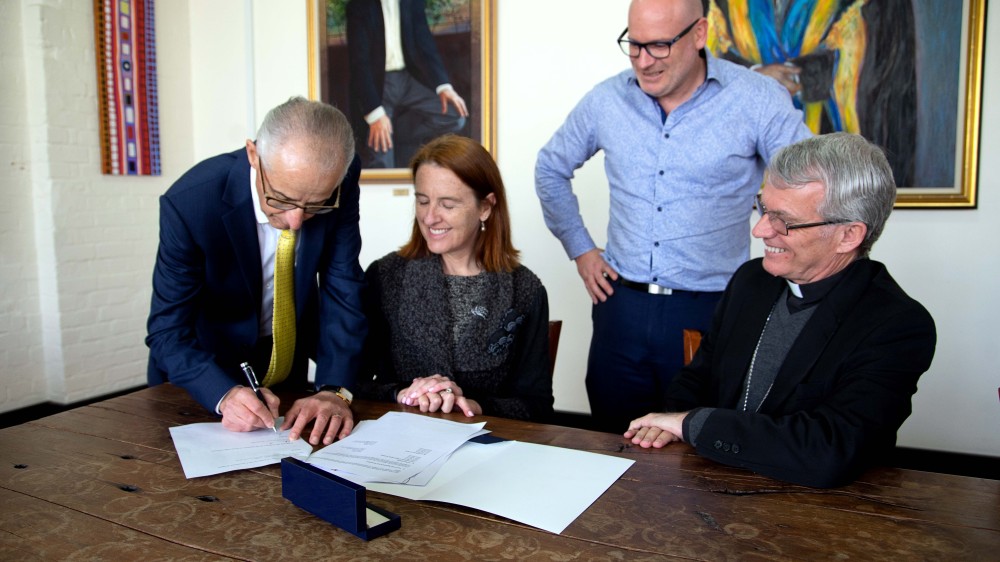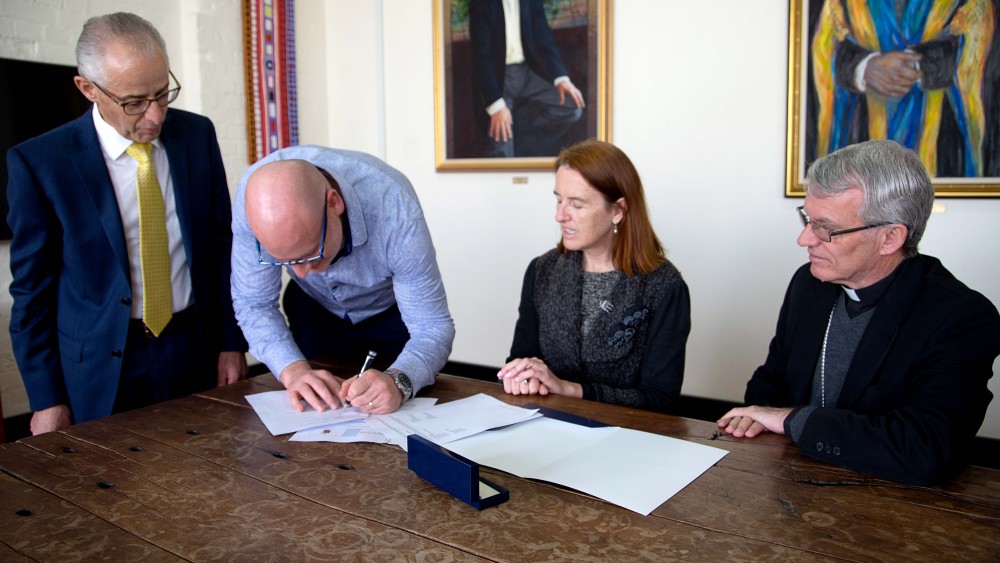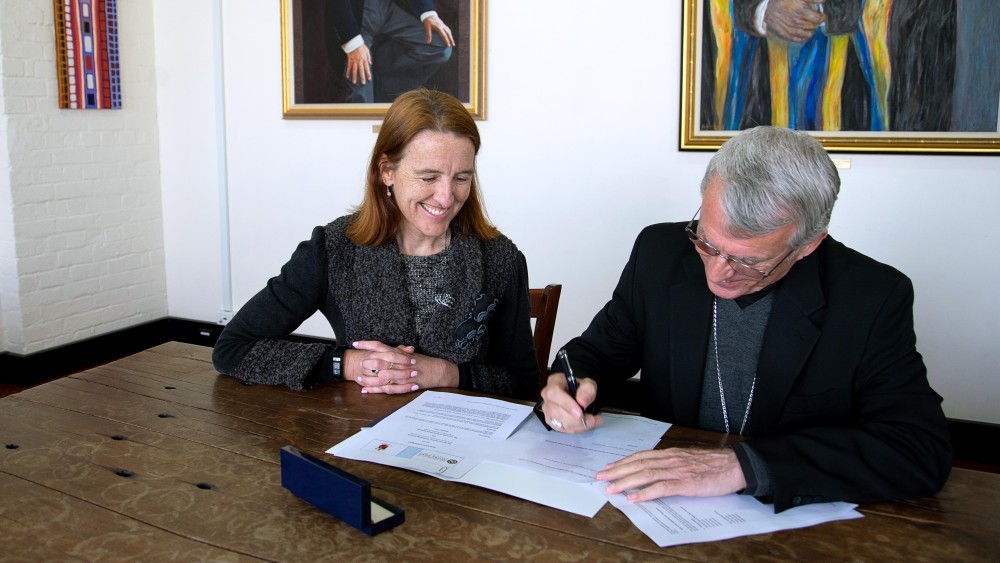Perth Archdiocese collaborates with Notre Dame in research agreement

Research and Project Development Manager at the Archdiocese of Perth Tony Giglia signing the agreement as the first witness. Photo: Amy Gibbs/UNDA.
By Theresia Titus
The Catholic Archdiocese of Perth and the University of Notre Dame Australia (UNDA) last week entered into a research agreement which will see the Archdiocese gain access to extensive data which to be used in making decisions about future service delivery and priorities.
Held in the Chancellor’s room at Notre Dame’s Fremantle campus, representing and signing for the Catholic Archdiocese of Perth was the Archbishop of Perth Timothy Costelloe and for UNDA was Vice-Chancellor Professor Celia Hammond on 5 September.
UNDA Associate Professor Dr Martin Drum, Politics and International Relations and Director of Public Policy, told The eRecord the agreement enables both parties to “fulfil their missions” by enabling them to conduct research “and then use the findings to discuss issues of relevance within our society”.
“It is important that we can underpin our commentary on social issues in the public domain with real evidence of the extent of the problems that exist,” Dr Drum said.
“The Catholic Intellectual Tradition calls on the university to engage with the broader community and make a valued and constructive contribution to society.
“This is expressed within our strategic plan, and this project helps fulfil this commitment,” he explained.

Dr Martin Drum, Senior Lecturer in Politics and International Relations and Director of Public Policy at UNDA, signing the agreement as the second witness. Photo: Amy Gibbs/UNDA.
Tony Giglia, Research and Project Development Manager of the Perth Archdiocese, indicated that the agreement would allow the Archdiocese to commission specific research projects as well as gather longitudinal data.
“The purpose of the research agreement is to provide the Archdiocese of Perth with accurate data over time to better inform decisions concerning the allocation of resources for the provision of support services and to assess the effectiveness of service delivery,” Mr Giglia said.
“The research agreement has also been established in response to a specific action in the Archdiocesan Strategic Plan.
“One of the significant benefits for the Archdiocese, other than those listed above, is to have sound longitudinal data collected where trends can be identified,” Mr Giglia explained.
“In this way, new and emerging priorities can be determined. Also, funding applications to various agencies will be supported by evidence and data.”
Mr Giglia also told The eRecord that consideration of the agreement began late-2016.
“The initial impetus for the Research Agreement came from Dr Terry Wilson once he was appointed as the Vicar for Social Outreach and he set about implementing the Strategies and Actions of the Archdiocesan Strategic Plan.
“As a first step, he approached Celia Hammond to determine the university’s interest in pursuing a research partnership,” Mr Giglia added.
“Once there was an agreement in principle to proceed staff from the university, and the Archdiocese worked collaboratively on the Research Agreement and the 2018 Research Project Scope.”

The University of Notre Dame Australia Vice-Chancellor Professor Celia Hammond and Archbishop of Perth Timothy Costelloe signing the research agreement. Photo: Amy Gibbs/UNDA.
The Archdiocese requires the university “to prepare an annual overview document”, currently for the year 2018, detailing “baseline data to support its strategic direction in social outreach activities”.
The data collected will be used to assist the Archdiocese in judging the need for new social outreach agencies or activities, review of current social outreach agencies, avoid duplication of social outreach activities and identify opportunities for partnerships with independent social outreach agencies that have similar outreach activities.
In preparing the initial document, the project scope stated “the university proposes to focus” on three key areas.
The first would be the overview of the critical issues such as the measures of poverty, minimum wage against the poverty line, National Median Equivalised Disposable Household Income, measures of homelessness and data on migrants.
The second area to focus on is the analysis of the abovementioned vital issues and “the public presence of Catholic agencies in WA.
The university also proposed the inclusion of case studies of individual agencies each year investigating the “assessment of the overall number of people the agency assists”, “breakdown of people assisted by gender, age and location”, trends of people needing assistance over an extended period of time, the gaps in the services offered by the Archdiocese, as well as services provided by “other relevant Catholic and non-Catholic agencies within the Perth Metropolitan and surrounding areas”.
“This analysis will offer a detailed, localised picture of the level of need in the Archdiocese, and the ability of Catholic agencies to respond to this need.”
The initial project update is anticipated towards the middle of October.
Mr Giglia said the Archdiocese might request the university “to undertake specific research projects” from time to time.
